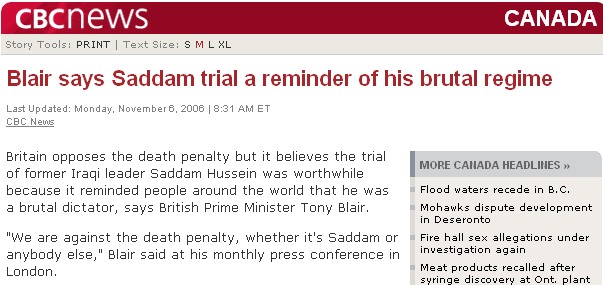Today is election day in the United States. Both houses of Congress are up for grabs tonight and the Democrats may regain the majority in the House of Representatives for the first time since 1994 or they may shift the balance in the Senate for the first time since 2002. If wildly successful tonight, the Democrats could take both houses and render George W Bush a lame duck president.
Many observers have noted that these midterm elections represent a referendum on the President and particularly his administration’s policy in Iraq. American foreign policy has often drawn fire from allies and opponents whether it has taken an activist or an isolationist approach. The war in Iraq has become a particular headache for the uS administration and it becoming increasingly unpopular domestically. Even some Republican candidates are shying away from the President’s plan.
Canadians have never had any love lost for the 43rd president of the American republic. Prior to Bush’s fall in job approval ratings at home, only 15% of Canadians gave him a pass with a solid 85% disapproving of his presidency. The cover story that described this poll in Maclean’s was aptly captioned “Hope you lose, eh”. One assumes that the 15% of Canadians that approved of George W Bush prior to the worst post-invasion days in Iraq has only diminished since then.
Tonight, American voters may just pass harsh judgment on Bush’s presidency by taking away what his critics have described as his “rubber-stamp” Congress. Without the numbers in Congress, much of the president’s agenda will never be enacted and many of the initiatives of the executive branch will be stymied.
If they are successful in taking both houses of Congress, Democrats will act over the next two years on two major initiatives. First, they will do what they can to set the stage to promote their eventual nominee for President in 2008. On this track, they will do their best to differentiate their policies and path from the Bush administration, particularly on Iraq. Many speak of redeployment of personnel from Iraq into other regions, but the Democrats may bring a significant contingent of their armed forces home to emphasize security on the home front rather than in foreign lands. Canada needs international support in Afghanistan from its other allies and while many internationalists do not consider Iraq to be a legitimate theatre in the global war on terror, diminished leadership from the Americans will cause others to hesitate. Perhaps one of the greatest threats to the Afghan mission is the hesitant nature of our NATO allies. A significant withdrawal from the American-initiated military effort would only weaken the resolve of other nations in the fight. Democrats speak of a “global test” or an “international consensus” on foreign policy. While we may all like a voice, leading by committee is a contradiction in terms.
If Congress is working to hamper Bush’s agenda, significant bi-partisan initiatives will also be impeded. Perhaps the most significant issue between Canada and the US at the moment is the Western Hemisphere Travel Initiative (WHTI). By 2007, everyone going between Canada and the US by air will require a passport. By 2008, this will include automobile traffic. The Canadian embassy in Washington has been working hard to lobby Congress to include flexibility in the bill. As $1B of trade, tourism and commerce passes between our two countries everyday, protectionist Democrats may see the WHTI as a convenient method to assuage their constituents in a variety of sectors from agriculture to industry. Many Americans do not currently possess a passport, therefore many will stay home to the detriment of Canadian business and workers.
Canadians will be watching the midterm elections closely tonight, however, we should consider what’s at stake.


![]()
